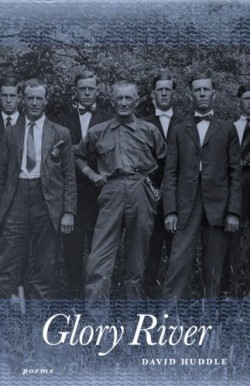Glory River
Glory River is David Huddle’s most eccentric and interesting collection yet. Always gentle and wry, often strange, his narrative poems here turn dark.
“River,” in the first half of the book, takes a look at what can happen to people can be in a community unchecked by contact with the outer world. One can hardly keep from reading the poems as a reverberation from present politics. The violence is held in check by sheer force—the teenage boys who take the girls for a ride, “jack / the truck up to a hundred, scare a cold sweat / out of her, then run a hand up her skirt // and get slapped good.” But the key poem of this section is the long, biblically-toned “The Cosmetic Surgeon Comes to Glory River.” In it the residents of Glory River get redesigned by the surgeon into their sexual ideal. When all Glory River has suffered “a betterization,” only a marble statue is left of the woman who had once been an icon of passion. And passion requires keeping imperfections; loving them, even.
The two halves of the collection appear to be question and answer to the problem of suffering. The second half returns to the personal: “The poem, yes, / but also that goofy / random texture of the real…” “1970” responds to “The Cosmetic Surgeon,” and the speaker recalls watching Hair with his friends, at the moment when the whole cast gets naked on stage. He sees this later as the pivotal point when the nation turned from love to greed, when he nodded off, half-drugged, instead of staying alert to receive “every megabyte of that vision.”
David Huddle’s fiction, essays, and poetry have appeared in Esquire, Harper’s, the New York Times Magazine, and The Best American Short Stories. The recipient of two NEA fellowships, he teaches writing at the University of Vermont, and is on the Faculty of the Bread Loaf School of English. In this latest collection Huddle maintains his exact and nothing-wasted lines—the product of a lifetime of listening deeply to the language.
Disclosure: This article is not an endorsement, but a review. The publisher of this book provided free copies of the book to have their book reviewed by a professional reviewer. No fee was paid by the publisher for this review. Foreword Reviews only recommends books that we love. Foreword Magazine, Inc. is disclosing this in accordance with the Federal Trade Commission’s 16 CFR, Part 255.

